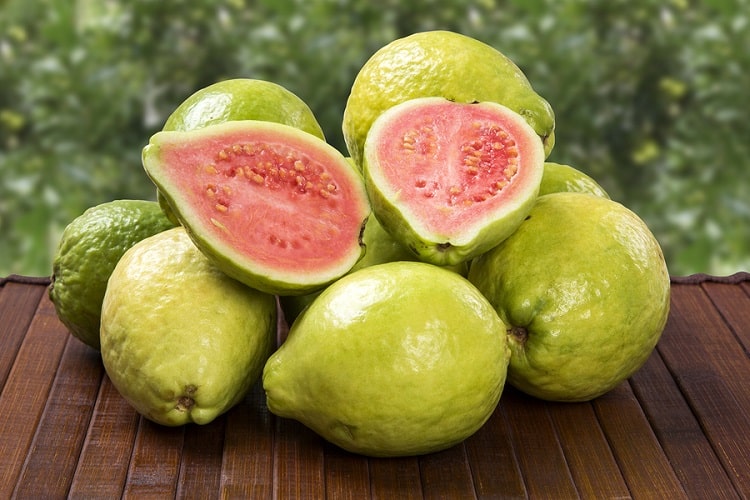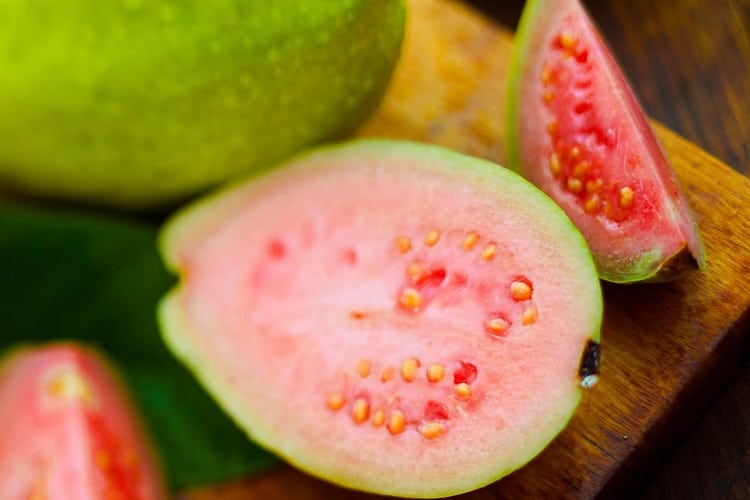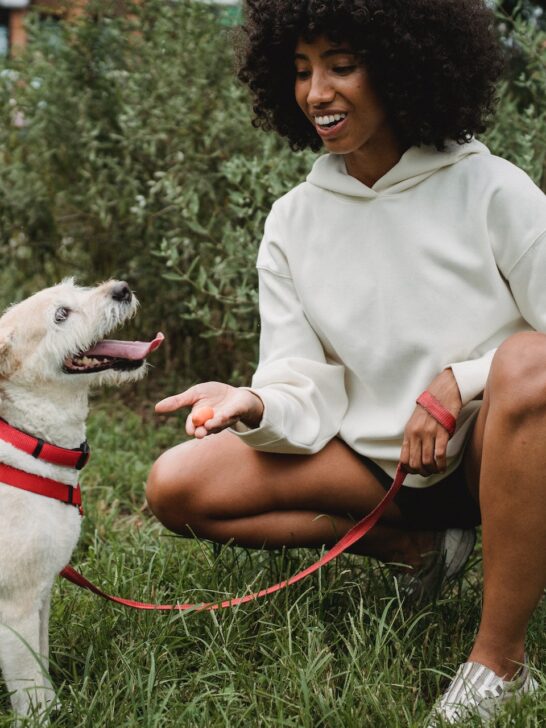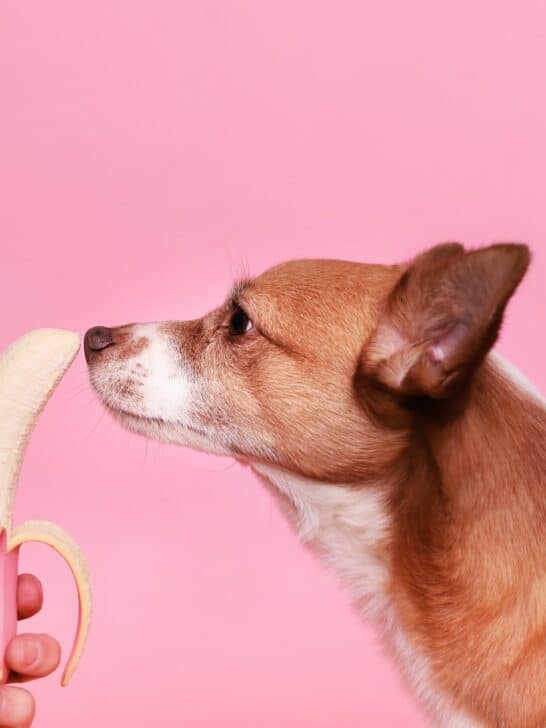Can Dogs Eat Guava?
Many fruits are beneficial for dogs, and the guava is just one of them.
Guavas are packed with nutritional benefits, and they’re easy to find in most grocery stores.
This article will outline everything you need to know about giving guavas to dogs, including:
- Where they grow
- The nutritional benefits
- How to store them
- Recipes for feeding them
- And common side effects
What is a Guava, and Where Does it Grow?

Guava is a tropical fruit native to Central and South America. The most common variety is the pink guava, which has pale green skin and pink flesh.
Guavas are relatively small, typically no more than four inches in length. They have a firm texture and a sweet, slightly tart flavor.
There are also white guavas, which are pale white flesh, and red guavas, which have reddish-pink flesh.
They can be eaten fresh or used in jams, jellies, and pies and are an excellent source of vitamins A and C, as well as dietary fiber.
Guavas are grown commercially in tropical regions worldwide, including Brazil, Mexico, India, and Thailand.
Should Dogs Eat Guava?

The answer is a resounding yes!
Guavas are a delicious and healthy treat for dogs. They are a good source of fiber, vitamins C and A, and minerals such as potassium.
Guavas also contain lycopene, which is an antioxidant that can help protect cells from damage.
Some dogs may find the seeds slightly irritating, so it is best to remove them before feeding guavas to your pet.
Like with any other fruit, moderation is essential, so avoid giving too much of this fruit to your dog.
Benefits of Guava

Guavas are a good source of vitamins and minerals beneficial to your dogs.
Vitamin A and K
Vitamin A improves the function of cells and the immune system in a dog’s body, while Vitamin K helps maintain bone health by avoiding blood clot formation.
Also, both vitamins are essential for maintaining healthy metabolism in dogs.
Vitamin C
Vitamin C is an immune-boosting vitamin for dogs, usually prescribed by a veterinarian during pregnancy or lactation in dogs.
It is an antioxidant that combats all the harmful items that enter a dog’s system.
If your dog has just undergone an operation or is on a lot of medication, giving them guava juice might be beneficial as Vitamin C in guava helps dogs cope with post-surgery stress.
Vitamin C can also help dogs with kennel cough, bacterial infections or abscesses, spinal problems, and hip dysplasia.
Potassium
One hundred grams of guava contains 417 milligrams of potassium.
Potassium is an electrolyte that the body needs to function normally. It aids in the maintenance of healthy organs and muscle growth.
Potassium helps dogs break down carbohydrates and fats to improve their digestive system.
Potassium’s other health benefits include improving cognitive function, regulating pH levels, and promoting efficient organ functioning.
B Vitamins
B-vitamins help with producing neurotransmitters in a dog’s brain. The process is called “neurochemical synthesis,” and the B-vitamins contained in guavas aid in the process.
Magnesium
Magnesium helps your dog absorb potassium and zinc. It also serves as a relaxant for dogs experiencing physical pain or stress.
Magnesium also helps regenerate muscles and contributes to well-functioning digestive, liver, and heart systems.
In addition, this fruit’s high fiber content can help regulate blood sugar levels and promote healthy digestion.
And because guava is low in calories, it’s okay to give them to your dog as treats with less risk of gaining weight.
Drawbacks of Guava

While guava may be a delicious and healthy treat for dogs, giving them too much can be dangerous.
The fruit’s flesh is high in sugar and can cause an upset stomach, diarrhea, and vomiting.
The guava’s seeds also pose a risk to dogs, as they can become lodged in the intestines and cause an obstruction.
The plant’s leaves also contain compounds that can be toxic to dogs if consumed in large quantities.
Allergic Reaction to Guavas in Dogs?

Some dogs may be allergic to guavas and may experience itching, swelling, or difficulty breathing after eating them.
If you suspect your dog is allergic to guavas, it is essential to seek medical attention immediately.
It is safe to give your dog a small piece of guava to eat.
However, if your dog does not have a history of eating fruits and vegetables, it is best to start with a small amount to see how they react.
How to Feed Guava to Your Dog

Start with a small amount of the fruit. This will help them get used to the taste and prevent digestive issues.
You can give whole, sliced, or pureed guavas to your dog.
- Whole Guava: You can give your dog whole guava but remove the seeds first. Of course, this is relative to the size of your current dog breed.
- Sliced Guava: You can slice the guava into small pieces or thin strips.
- Pureed Guava: You can also puree the guava and mix it with your dog’s food. This is a good option for dogs who are picky eaters or have trouble chewing.
Conclusion
Guavas are a healthy and delicious snack for dogs, but always keep in mind to give them in moderation so your dog won’t experience an upset stomach.
The fruit is a good source of vitamins and antioxidants, and it can help regulate blood sugar levels and promote healthy digestion.
Guavas also have natural laxative properties that can help with constipation in dogs.
Keep in mind that the guava plant also contains compounds that can be toxic to dogs, so your dog mustn’t eat any part of the plant.
Resources:
FAQ:
1. What are the nutritional benefits of guavas for dogs?
Answer: Guavas are an excellent source of fiber, vitamins A and C, minerals such as potassium, and antioxidants like lycopene. They can help regulate blood sugar levels, promote healthy digestion, and combat harmful substances that enter your dog’s system.
2. Can dogs eat guavas?
Answer: Yes, dogs can eat guavas. They are a tasty and healthy treat for dogs, as long as you remove the seeds first to avoid irritating your pet.
3. How much guava should I feed my dog?
Answer: Start with a small amount of guava to see how your dog reacts to it. Too much guava can upset your dog’s stomach, leading to vomiting or diarrhea. Moderation is the key to ensure your dog’s wellbeing.
4. Can guavas cause an allergic reaction in dogs?
Answer: Some dogs may be allergic to guavas, and it can cause itching, swelling, or difficulty breathing. If you think your dog has an allergic reaction to guavas, seek immediate medical attention.
5. How can I feed guavas to my dog?
Answer: You can give your dog whole, sliced, or pureed guavas. Make sure to remove the seeds before feeding them. Start with a small amount and monitor your dog’s reaction to avoid digestive issues. Pureed guava is a good option for picky eaters or dogs who have difficulty chewing.






























